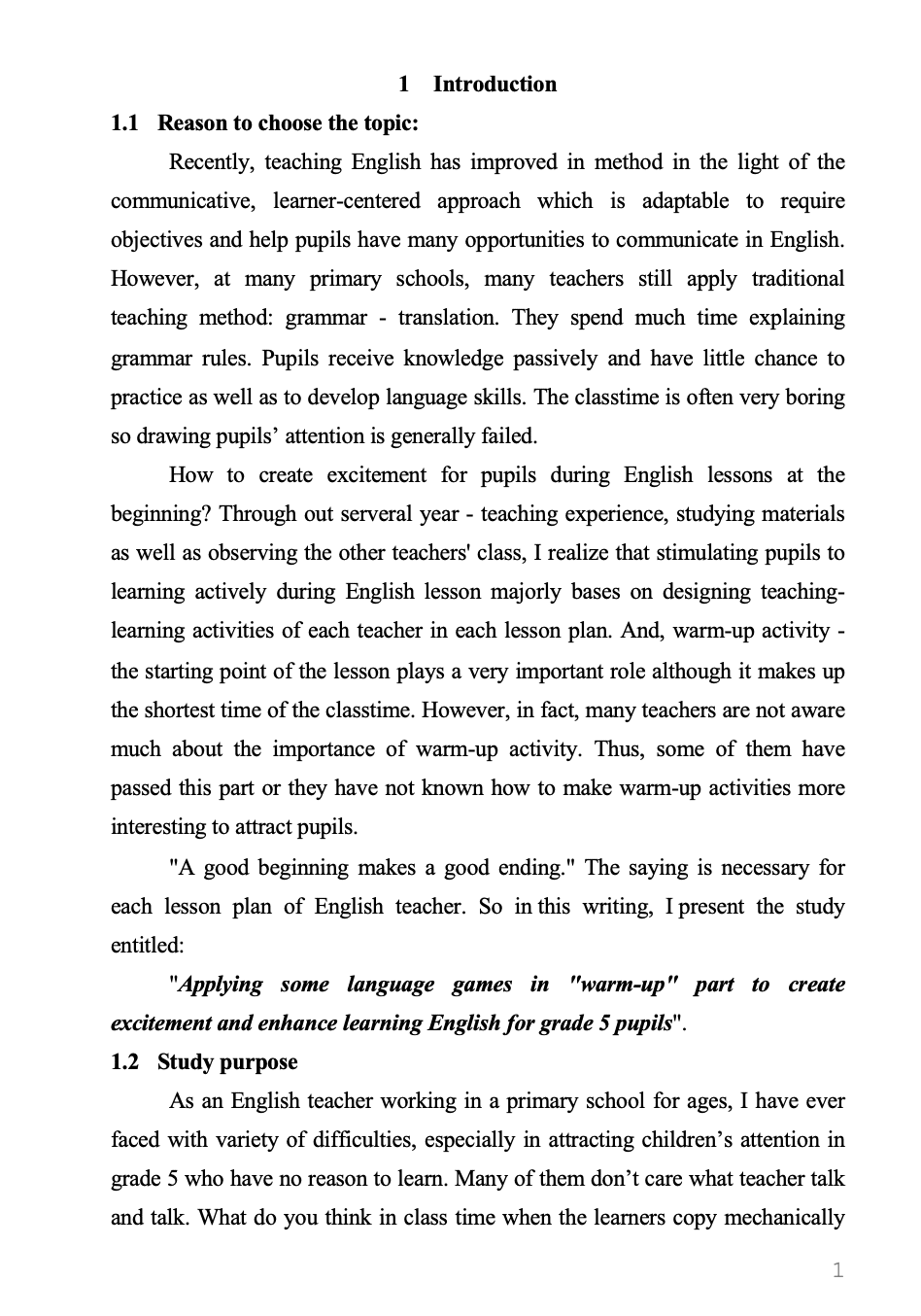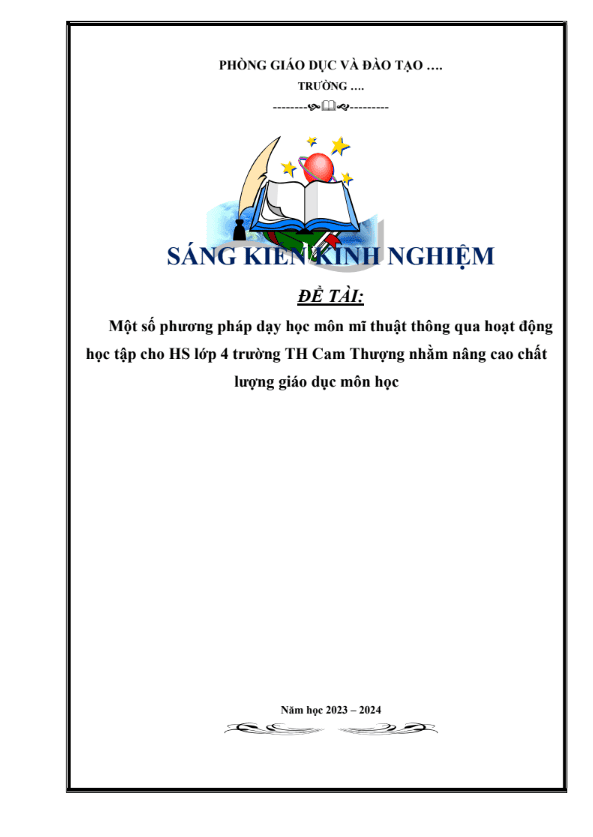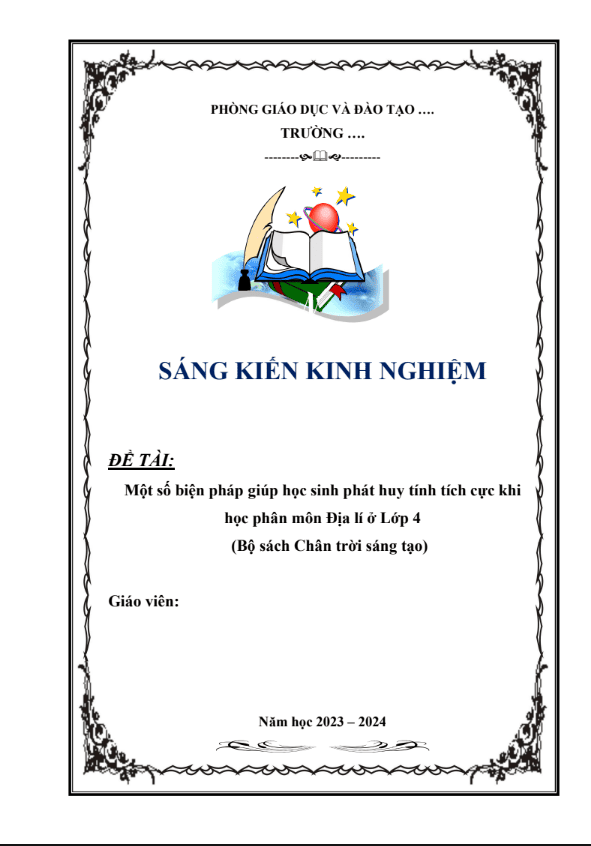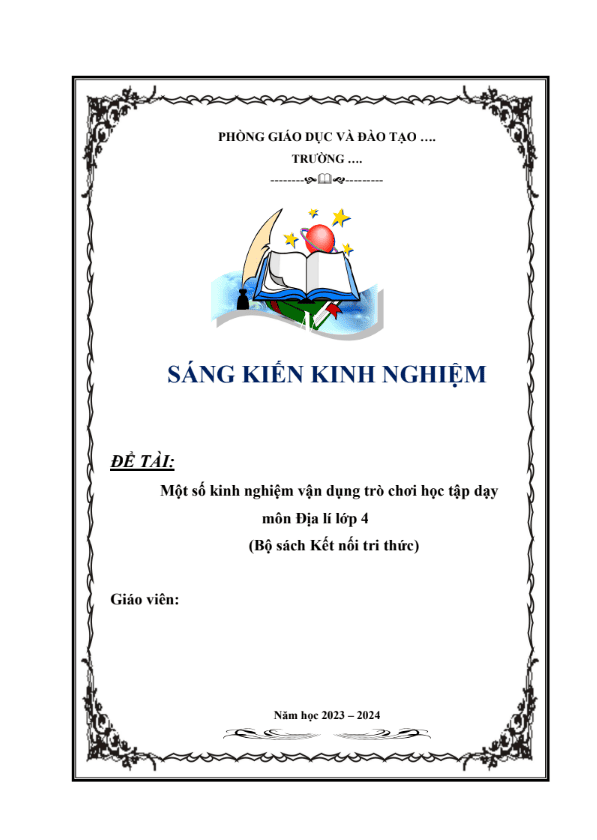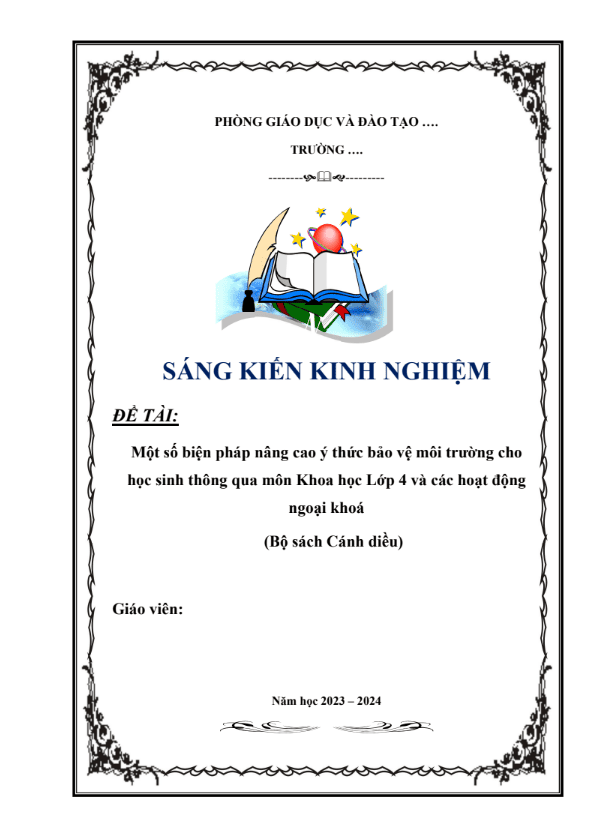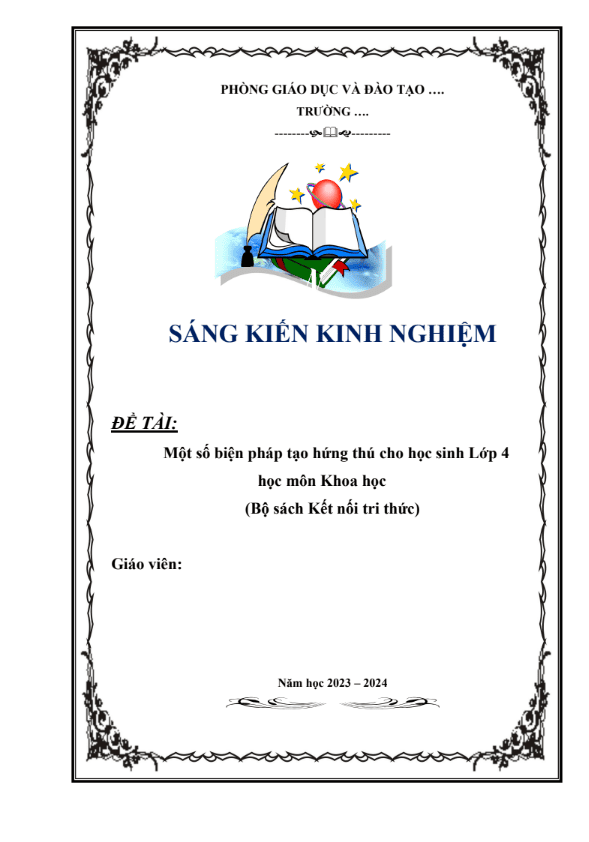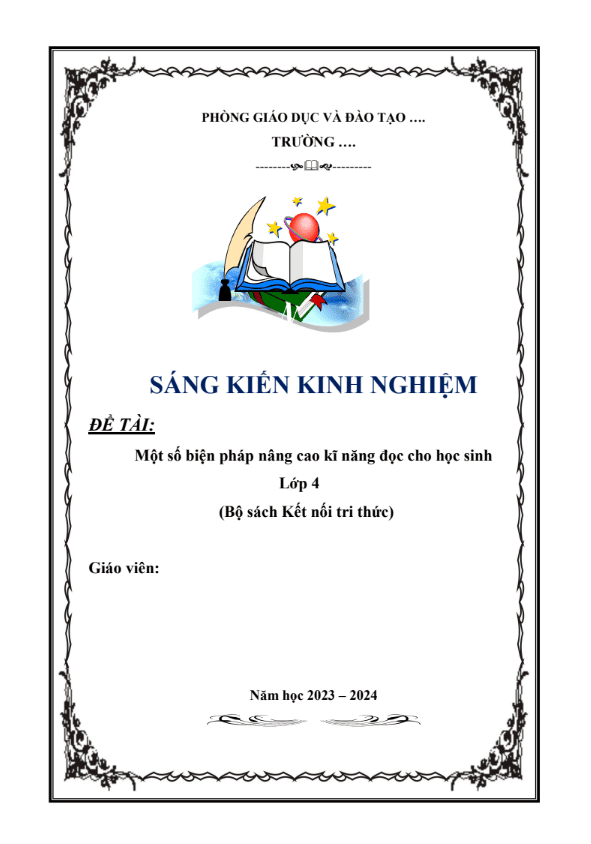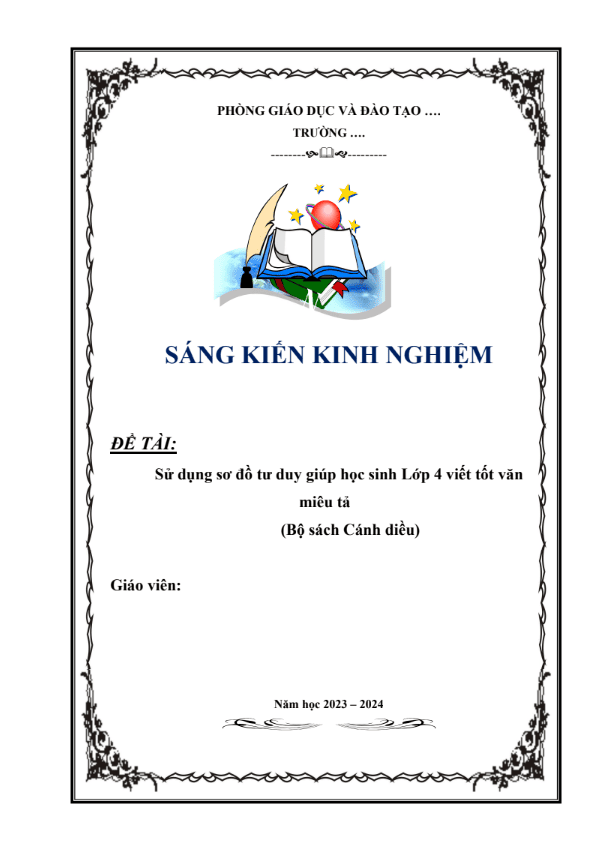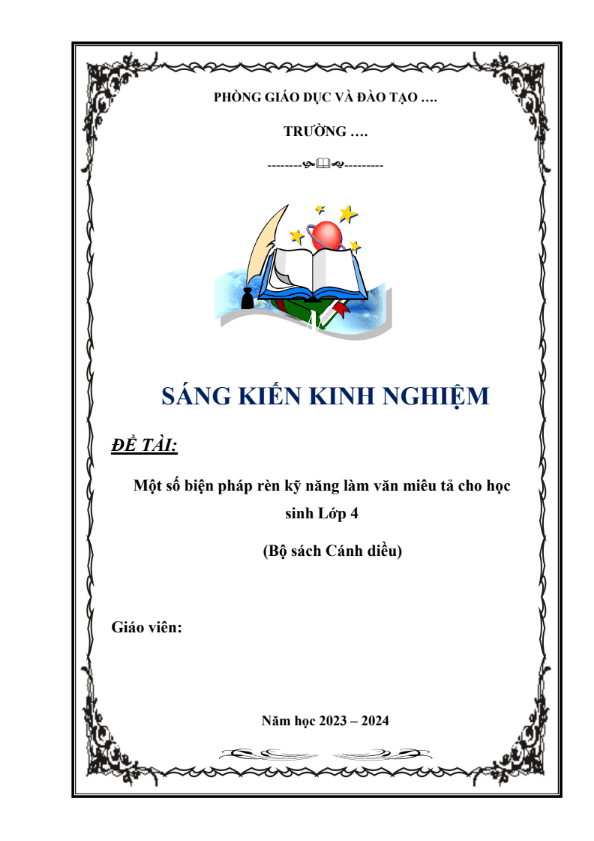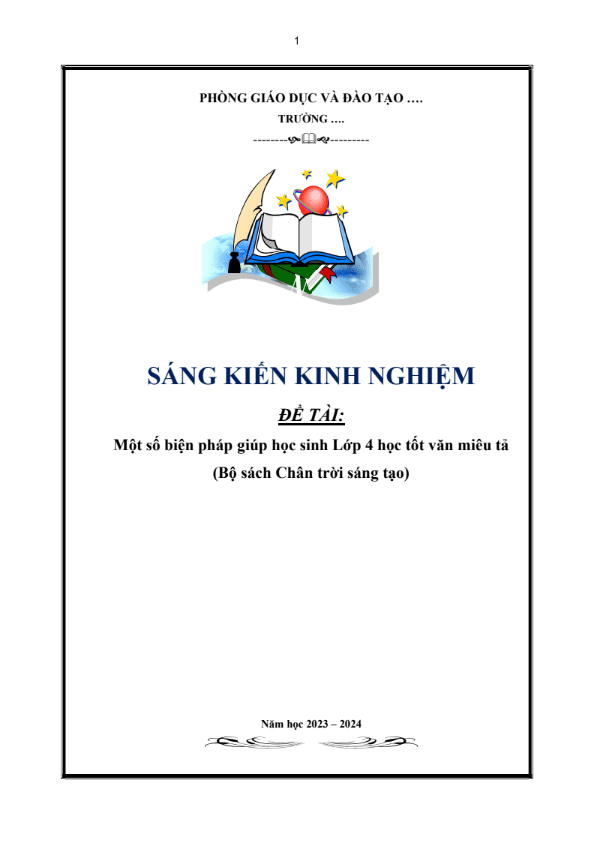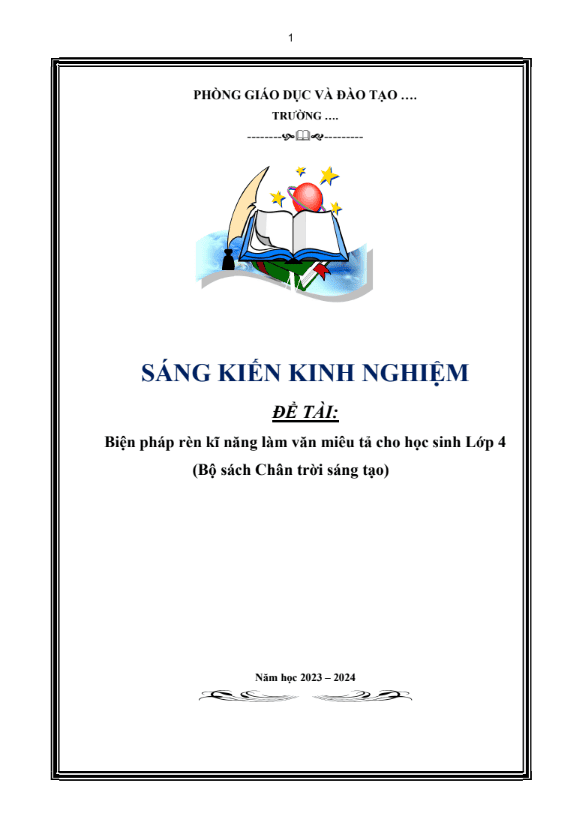SKKN Applying some language games in “warm – up” part to create excitement and enhance learning English for grade 5 pupils
- Mã tài liệu: BM5097 Copy
| Môn: | Tiếng Anh |
| Lớp: | 5 |
| Bộ sách: | |
| Lượt xem: | 335 |
| Lượt tải: | 6 |
| Số trang: | 27 |
| Tác giả: | Phạm Thị Hồng Hạnh |
| Trình độ chuyên môn: | Thạc sĩ giáo dục |
| Đơn vị công tác: | Trường Tiểu học Ngô Quyền |
| Năm viết: | 2020-2021 |
| Số trang: | 27 |
| Tác giả: | Phạm Thị Hồng Hạnh |
| Trình độ chuyên môn: | Thạc sĩ giáo dục |
| Đơn vị công tác: | Trường Tiểu học Ngô Quyền |
| Năm viết: | 2020-2021 |
Sáng kiến kinh nghiệm “SKKN Applying some language games in “warm – up” part to create excitement and enhance learning English for grade 5 pupils” triển khai các biện pháp như sau:
2.3 Some “warm-up” activities applied in teaching English 5.
2.3.1 Game: “The God says…..”
2.3.2 Game: “Slap the board”
2.3.3 Game: “Lucky numbers”
2.3.4 Game: “Pass the secret”
2.3.5 Game: “Kim’s game”
2.3.6 Game: “Mysterious picture”
2.3.7 Game: “First riddle”
2.3.8 Game: “Find the other halves”
2.3.9 Game: “Win the box”
2.3.10 Game: “Crossword puzzle”
2.3.11 Game: “Noughts and crosses”
Mô tả sản phẩm
- Introduction
- Reason to choose the topic:
Recently, teaching English has improved in method in the light of the communicative, learner-centered approach which is adaptable to require objectives and help pupils have many opportunities to communicate in English. However, at many primary schools, many teachers still apply traditional teaching method: grammar – translation. They spend much time explaining grammar rules. Pupils receive knowledge passively and have little chance to practice as well as to develop language skills. The classtime is often very boring so drawing pupils’ attention is generally failed.
How to create excitement for pupils during English lessons at the beginning? Through out serveral year – teaching experience, studying materials as well as observing the other teachers’ class, I realize that stimulating pupils to learning actively during English lesson majorly bases on designing teaching-learning activities of each teacher in each lesson plan. And, warm-up activity – the starting point of the lesson plays a very important role although it makes up the shortest time of the classtime. However, in fact, many teachers are not aware much about the importance of warm-up activity. Thus, some of them have passed this part or they have not known how to make warm-up activities more interesting to attract pupils.
“A good beginning makes a good ending.” The saying is necessary for each lesson plan of English teacher. So in this writing, I present the study entitled:
“Applying some language games in “warm-up” part to create excitement and enhance learning English for grade 5 pupils“.
- Study purpose
As an English teacher working in a primary school for ages, I have ever faced with variety of difficulties, especially in attracting children’s attention in grade 5 who have no reason to learn. Many of them don’t care what teacher talk and talk. What do you think in class time when the learners copy mechanically what teacher write on the board into their notebooks? However, every thing is different when pupils are in good mood, they will involve in the lesson better. How could I attract pupils’ attention? That’s why I choose this topic.
In this research, I would like to mention some games and the basic techniques to conduct the games effectively during English lessons.
- Study object:
Applying some language games in “warm-up” part to create excitement and enhance learning English for grade 5 pupils.
- Study measure:
- Observation method: investigate materials about methodology of teaching games myself as well as attend my colleagues’ English lessons.
- Experience method: apply language games in teaching periods in English textbook at school.
- Investigation method: make questions in order to test and check pupils’ understanding.
- New point of the research:
- One game may be applicated to many units in textbook.
- These highly applicable games are especially focused on specific units in English 5 textbook.
- These games are illustrated with interesting pictures. The teams are named familiarly and cutely.
- Content
- The basis of reasoning:
Some researchers such as Nguyen and Khuat (2003) have shown that students are bored with learning in traditional methods like rehearsing, writing words on papers or learning passively through teacher’s explanations. Nguyen and Khuat (2003) believe that learners prefer to learn the English language in a pleasant atmosphere such as vocabulary games. They believe that in an interesting and communicative class learners can learn 80 percent of what they exposed to. Hence, apply language games in English class is very significant to create excitement for learners.
Nguyen and Khuat (2003), using games provides a relaxing and funny environment for learners, therefore, help them to learn better. They believe that learners are interested in friendly competition which motivates them to voluntarily involvement in the classroom tasks.
According to the methodology of teaching English, language game is an active method in which learners are placed in the centre. To achieve the goal of games, a player has to communicate with each other. In other words, they ought to discuss in their groups quickly in order to find out the final result to defeat other groups. It’s necessary for the players to use languages, to express necessary information for completing games.
In language games, a teacher plays as a guide or an adviser, who elicits pupils’ reaction, helps them understand the problems which need to be discussed or the teacher may explain clearly the role of the players. The teacher sometimes supplies the new words, new structures that the players are unfamiliar.
- Real situation of teaching and learning English
From applying new English teaching methods, “warm-up” has been become main stage in teachers’ lesson plans. Some teachers have paid attention and prepared carefully warm-up activities. However, some others are not aware much about the importance of warm- up activities. They still think that these activities are unnecessary. Thus, instead of having better preparation for warm-up activities, they often check old lesson to get oral marks before teaching new lesson. This makes pupils stressful and the class time boring.
Moreover, for pupils at my primary school, they have approached new teaching methods, but they seem to be embarrassing when they take part in some warm-up activities. To know exactly about this problem, I have investigated 69 pupils in 2 classes 5A and 5D by asking them the following questions:
After the survey, I get the bellow result:
| Total | very like | like | normal | Dislike | ||||
| No | % | No | % | No | % | No | % | |
| 69 pupils | 19 | 28% | 25 | 36% | 15 | 22% | 10 | 14% |
The result reveals that most of good pupils are interested in warm-up activities while lower pupils who are shy. Students’ different proficiency level in a class causes difficulty for teachers to choose activities which are suitable for whole class. Many activities can be applied well in this period but they also are boring in the other ones. Lots of warm-up activities make good pupils excited while bad pupils could not participate in.
Besides, my school is located in half-plain and pure agricultural area so pupils have less chance to communicate in foreign language in daily life. They are so shy and timid to speak as well as express their ideas, thoughts in warm-up activities so they seem not to want to take part in.
From those reasons, the study entitled “Applying some language games in “warm-up” part to create excitement and enhance learning English for grade 5 pupils” has been conducted with the hope to make teachers and pupils more aware of the importance of warm-up activities.
- Some “warm-up” activities applied in teaching English 5.
Beginning from the actual situation as described in section reason initiatives proposed in my own experience teaching process, I tried to figure out some language games to motivate pupils to attract their attention. I am pleased to present some games for instance The God say…., Slap the board, Lucky numbers, Pass the secret, Kim’s game, Mysterious pictures, First riddle, Find the other halves, Win the box, Crossword puzzle. These games have been applied in my school in recent years, especially creating excitement and enhancing learning English with the demonstration in some detailed units in textbook as below.
- Game: “The God says…..”
Aim: Revise the words related to the lesson.
Time: 5 minutes
Preparation: name of activities
Work arrangement: whole class
Procedure:
- The teacher instructs pupils to carry out actions by saying. If the teacher does not begin with The God says…, the pupils do not follow the instruction.
- Teacher models with the whole class the first time.
- When the pupil does wrong, he or she will be out of the game by standing near the blackboard.
- Until the end of the game, anyone who failed will be punished.
- The punishment is copying the sound of different animals.
Specific lessons:
This game is capable applied to the following lessons: “Unit 12: Don’t ride your bike too fast!”, “Unit 13: What do you do in your free time?” or “Unit 2: I always get up early. How about you?”
Unit 2: I always get up early. How about you?
Lesson 1: part 1, 2, 3
- Teacher says: The God says …. Sit down!
- Actions can be chosed: “Stand up”, “Do morning exercises”, “Brush your teeth”, “Cook dinner”, “Watch TV”, “Do homework”, “Have breakfast”, “Go cycling”, “Listen to music”, “Go to school”, “Play table tennis”, “Play badminton”, “Go fishing”.
- Game: “Slap the board”
Aim: Revise the words related to the lesson.
Time: 5 minutes
Preparation: 8 words of means of transportation
Work arrangement: group work
Procedure:
- Teacher (T) puts the flashcards of the words on the board.
- T divides class into two teams Batman and Superman.
- T invites each team four pupils to go to the blackboard and lines them up (two lines).
- T calls out one word and the pupils in each team should slap quickly the corresponding word on the board.
- The team to slap quicker and more correct words will be the winner.
- Declare the winner.
Specific lessons:
- This game can be applied to any lessons in English 5 textbook, for instance:
Unit 3: Where did you go on holiday?
Lesson 2: part 1, 2, 3
- Game: “Lucky numbers”
Aim: Revise the sentence patterns related to the lesson.
Time: 5 minutes
Preparation: 8 numbered questions
Work arrangement: group work
Procedure:
- T puts the pictures of numbers on the board.
- T divides class into two teams Cat and Dog.
- Each team chooses a number in turn. The team will respond the requirement in each number. If responding is correct, they will get one mark. If it is wrong, they will spend right to answer to the left team.
- The team may score one mark without answering if they get a lucky number.
- T gives feedback for each respond and marks for each team.
- The team with more marks will be the winner.
Specific lessons:
- This game is capable applied to all the lessons in textbook to make a funny and interesting lesson, for example:
Unit 4: Did you go to the party?
Lesson 1: 4.5.6
Questions:
|
|
|
|
|
|
|
|
- Game: “Pass the secret”
Aim: stimulate pupils to remember sentences related the topic of the lesson.
Time: 5 minutes
Preparation: 6 sentences related to the lesson
Work arrangement: group work
Procedure:
- T divides class into 3 teams. Each team makes a line.
- A pupil sitting in the first line of each team goes to the board and receives the message from the teacher. He or she remembers the sentence. After that, he or she returns to the team and whispers the sentence in the next sitting pupil’s ear. The game continues like that to the pupil standing in the last line.
- The last pupil in each team goes to board and report the message which the teacher whispered. The team having more correct sentences in the shortest time will be the winner.
- T checks and declares the winner
- T leads in to the new lesson.
TÀI LIỆU LIÊN QUAN
- 0
- 155
- 1
- [product_views]
- 6
- 163
- 2
- [product_views]
- 8
- 188
- 3
- [product_views]
- 3
- 125
- 4
- [product_views]
- 5
- 118
- 5
- [product_views]
- 8
- 110
- 6
- [product_views]
- 7
- 116
- 7
- [product_views]
- 0
- 188
- 8
- [product_views]
- 5
- 192
- 9
- [product_views]
- 1
- 187
- 10
- [product_views]

